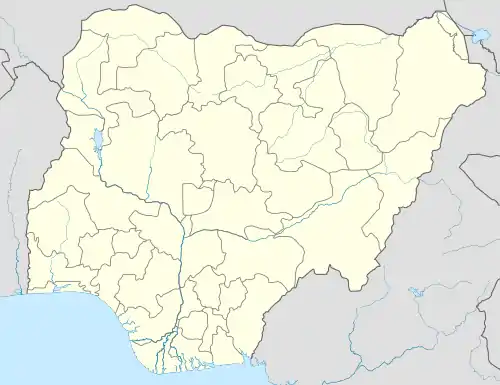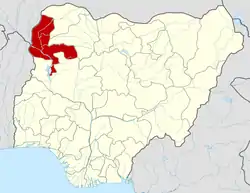Gwandu
Gwandu, also called Gando, is a town and emirate in Kebbi State, Nigeria. The seat of government for the emirate[1][2] and district of this name is in Birnin Kebbi, which is the capital of Kebbi State and was capital of the historical Kingdom of Kebbi.[3] Founded in the sixteenth century by the Kabbawa, a Hausa-speaking people, Gwandu today acts as one of the four emirates composing Kebbi State.[4]
Gwandu
gwandu | |
|---|---|
LGA and town | |
| Nickname(s): TA ABDULLAHI | |
| Motto(s): land of farmers and readers | |
 Gwandu | |
| Coordinates: 12°30′8″N 4°38′33″E | |
| Country | |
| State | Kebbi State |
| Time zone | UTC+1 (WAT) |
The town became important during the Fulani jihad, and from 1815 it was one of the two capitals of the Fulani empire[5] until it came under British control in 1903.[6][7][8]
References
- Balogun, S. A. (1973). "Succession Tradition in Gwandu History, 1817-1918". Journal of the Historical Society of Nigeria. 7 (1): 17–33. ISSN 0018-2540. JSTOR 41856982.
- Jimoh, Mufutau Oluwasegun (2017-05-01). "Gwandu Emirate: The Domain of Abdullahi Fodiyo, Since 1805". Journal of Pan African Studies. 10 (3): 386–390.
- Balogun, Saka Adegbite. (1970). Gwandu emirates in the nineteenth century with special reference to political relations, 1817-1903. OCLC 38630457.
- "GWANDU". doi:10.1163/_eifo_sim_2570. Cite journal requires
|journal=(help) - Hopen, C. Edward (2018-09-03). The Pastoral Fulbe Family in Gwandu. Routledge. ISBN 978-0-429-95044-5.
- Tukur, Mahmud Modibbo (2016-08-15). British Colonisation of Northern Nigeria, 1897-1914: A Reinterpretation of Colonial Sources. Amalion Publishing. ISBN 978-2-35926-048-9.
- "Gwandu | Nigeria". Encyclopedia Britannica. Retrieved 2019-03-20.
- "GWANDU". doi:10.1163/_eifo_sim_2570. Cite journal requires
|journal=(help)
This article is issued from Wikipedia. The text is licensed under Creative Commons - Attribution - Sharealike. Additional terms may apply for the media files.

